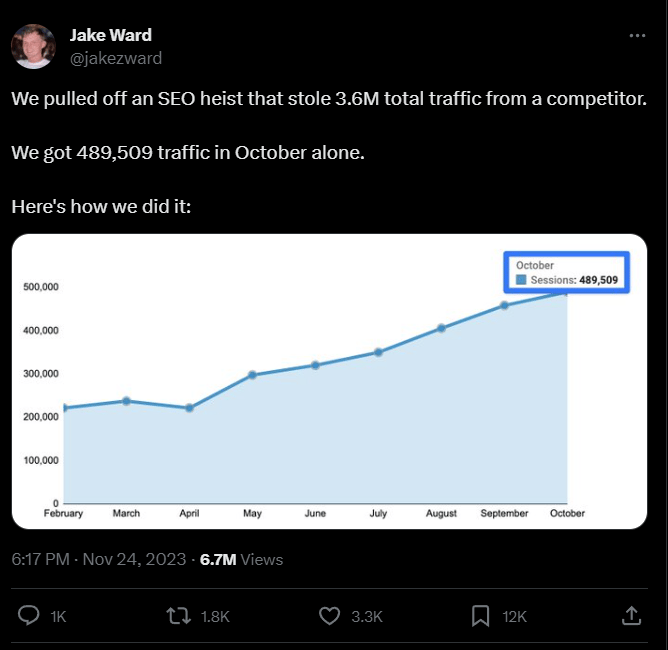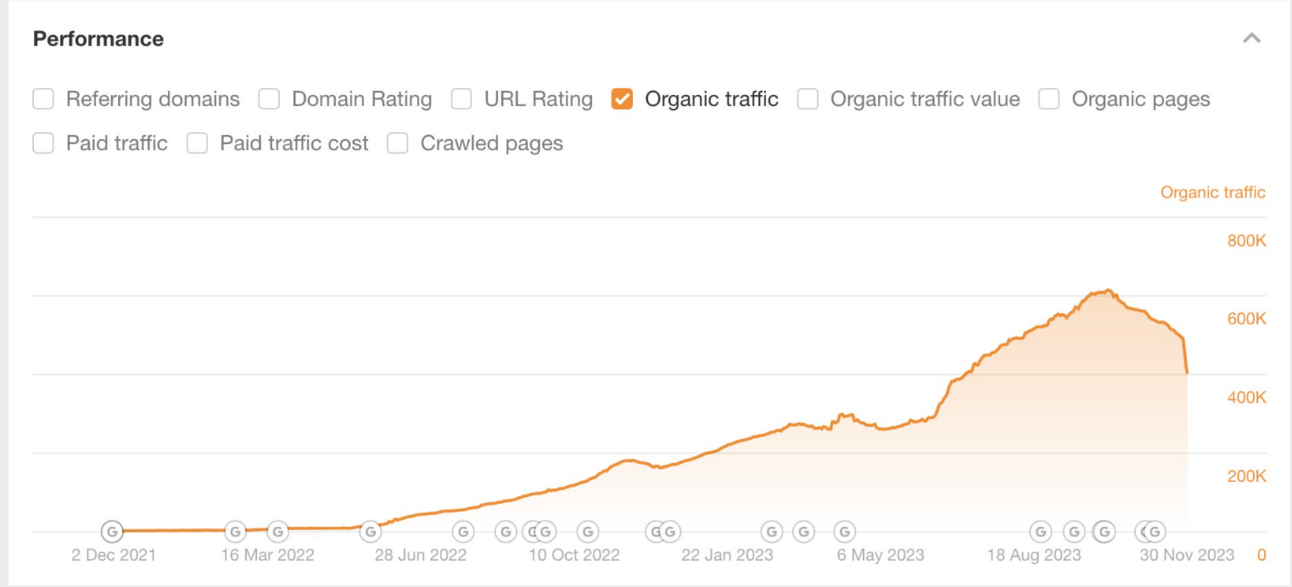- eCom Money
- Posts
- The downfall of the million dollar SEO heist
The downfall of the million dollar SEO heist
The other day, while I was scrolling through my Twitter feed, I came across that now-infamous thread from Jake Ward.
The thread:

Now…
If you’re active on Twitter, especially the SEO side, you likely already saw the tweet (and ensuing debate).
But anyway…
Here’s how Jake was able to pull off of this million-dollar SEO heist:
(Spoiler alert: He gets caught later on)
First things first, I want to say that the language he used in the thread, especially the hook, was perfect!
There’s absolutely no way you scroll by this and you’re not clicking on it.
Which is one of the reasons why it’s got 6.7 million views — that’s INSANE!
Secondly, there are a couple of things that Jake did to successfully pull off this million-dollar SEO heist:
Exported a list of the sitemap
Turned the list of URLs into article titles
Created 1800 articles from those titles at scale using AI
Now…
I recently spoke about this newly identified process in an email and
was doing something similar.
Essentially, what I was doing was:
Scraping my competitor's RSS feed
Spinning their content with ChatGPT
Publishing a new article on the same current events as my competitor’s (without hiring a full writing team)
Jake used a site map and I used the RSS feed — they're basically the same.
Say what you want about our moral compasses… These are both brilliant SEO tactics.
Now… as usual… a lot of people had mixed opinions.
And there were two sides.
On one side, the holier-than-thou, talking heads of SEO — obviously 🙄 — weren’t happy with this and had a lot to say about it.
Things like:
===
“HE STOLE EVERYTHING FROM HIS COMPETITORS USING AI!”
“THIS ISN’T HOW SEO IS SUPPOSED TO BE!!”
===
And the other side:
Which included myself and plenty of other successful SEOs.
Because without a doubt, this is really really smart.
You see…
EVERYONE is doing competitor research
Jake just did it smarter, faster, and better than literally everyone else.
What most people fail to understand is…
How much time it would take to research, plan, and write 1800 articles manually…
It’d take you months, even with a full-fledged content team.
And Jake was able to do it in a matter of hours (maybe days) — at some point, you have to applaud the thief for his creativity.
Now, he himself uses the word “stole” in his tweet. Again, this is an incredible hook and it practically forces you to scroll through the thread.
And to his credit, he racked up millions of views.
But people don’t like the word “stole.”
Fine, I’ll level with those people – it’s a bit of a harsh term.
But on the flip side, if you want your brand in the #1 spot, you’re going to have to steal.
Think about it…
Two websites cannot equally share the same amount of organic traffic & revenue in the #1 spot.
Fact: Your website that ranks #2 will receive less organic visitors & accumulate less organic revenue than your competitor in the #1 spot.
Also a fact: If you finally outrank them and climb into #1 spot, you will make more money & drive more organic visitors than them.
Which means that you have just taken a significant share of their organic revenue & traffic away from them.
So… in theory:
YOU did steal.
And YOU did take their money away from them.
I mean… sure, you didn’t take it directly from their bank account, but you still took the potential revenue away from them.
Now…
This is where the thief gets caught and is sentenced to a Good ol’ Penalty.
AI content is a great way to scale your content production.
But it has its own set of risks…

This morning, I came across a tweet that posted this graph.
And to my surprise this was…
Jake Ward’s site.
😱
Yep… that’s right.
This is the exact same site from the case study I just referenced.
It’s already on its way down, possibly to zero.
But how?
He did everything right… In fact, he did it better than everyone else.
My best guess for this downfall is…
A couple of people with way too much time on their hands figured out that it was Causal — that’s the name of the website.
And went through all of his old social media content and made the connection.
I had no idea what Causal is… or does… but ever since he posted his results on X and it exploded…
I’m assuming that a Google quality rater went in and manually penalized the site.
Look…
AI content is great.
It can work well and it’s infinitely scalable compared to human writers.
But you can’t just publish a ton of AI content forever.
Google will only rank high-quality content in the #1 spot.
And odds are… 1 out of every 100 AI articles (if they’re not QA’d), will qualify as “high-quality content.”
But there are definitely use cases for publishing hundreds or even thousands of articles with AI.
The most common method is to:
Buy a domain
Build a quick & easy site
Churn & burn that site in 90 days
And the reason this works for certain people is because…
That’s their business model.
If a legitimate business — like you — is posting AI content at scale, then I would advise you to slow down a bit.
Here’s what you should do instead:
Hire an editor (or do it yourself) to review & upgrade the content for readability, internal linking, fact-checking, brand style, etc.
Then, resume writing with AI at a sustainable rate while also implementing a QA system before hitting publish.
Caution: If you run an agency, or own a portfolio of sites, or even just own one site…
DO NOT DOX YOURSELF!
You might end up in the next edition of this newsletter.
If you need a proven and winning SEO strategy that ranks your site #1 without publishing any AI content then you might want to check this video out.
Until next time,
Kai Cromwell
Reply